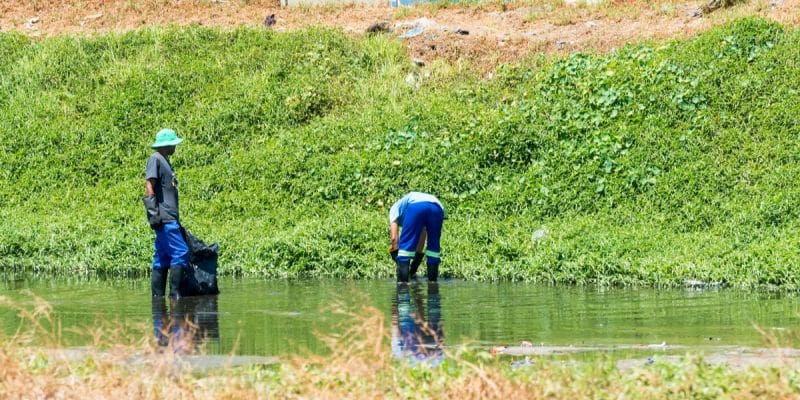The concept of 'the environment' really took hold in Africa in the 1990s. It came to the fore especially in the wake of the 'Earth Summit' in Rio de Janeiro, Brazil. This was a global event that gradually made the consideration of environmental issues in development policies a global leitmotif. In Africa, the evolution of the concept of environmental protection will also be marked by the continent's vulnerability to the effects of climate change.
The current understanding of environmental protection in Africa is not far removed from that in the rest of the world. The concept of environment in Africa has evolved rapidly in response to current climate challenges. The requirements of the past have been reinforced by new obligations. Here, protecting the environment involves approaches, actors and means identical to those used in the West or in Asia: ecotourism, agro-ecology, circular economy, green economy, green energy, energy efficiency, sustainable city, everything is there. Today, environmental protection in Africa includes issues of biological diversity, preservation of natural resources, and means of reducing and adapting to climate change.
Combating climate change
Climate change mitigation and adaptation is one of the latest approaches to environmental protection around the world. As global warming is a phenomenon with global consequences, world leaders have understood the need to act together. This is what the Conference of the Parties (COP) to the United Nations Climate Convention, launched in 1995 in Berlin, Germany, is all about. The 2015 COP 21 calls on its signatory members to reduce greenhouse gas emissions in order to minimise the human impact on climate change. It sets quantified targets for each country or region for greenhouse gas emissions and the corresponding reductions to be achieved. This quantified commitment is achieved through a series of political measures and commitments, which are reviewed and updated at the annual meetings of the signatory countries to the climate convention, which reached 197 countries in 2018.
Africa is particularly challenged in this battle. In addition to preserving forests (especially the Congo Basin forest, the second largest forest in the world after the Amazon forest) to regulate the climate, Africa must adapt to climate change and cope with natural disasters, despite limited financial means. Consisting mainly of developing countries, the continent is also the first victim of climate disruption, notably because of the aggravation of water stress in the north and south of Africa. But there are other consequences that particularly affect Africa. In a study published in January 2021, the non-governmental organisation (NGO) Germanwatch notes that Mozambique, Zimbabwe, Malawi, South Sudan and Niger are among the ten countries in the world most affected by climate change. According to the same source, Mozambique loses about 362 million euros a year due to flooding caused by cyclones. Zimbabwe was hit hard by Cyclone Idai in 2019 and has estimated the cost of repairing the damage at €900 million.
Read also: AFRICA: the circular economy at the heart of ecosystem preservation
The battle for biodiversity
Biodiversity conservation is also one of the most recent developments in environmental protection in Africa. The need to preserve biodiversity has been reinforced in Africa, as in the rest of the world, by the publication in 2019 of the report on the Global Assessment of Biodiversity and Ecosystem Services, produced by the Intergovernmental Science-Policy Platform on Biodiversity and Ecosystem Services (IPBES). The report’s findings, based on years of hard work by the many scientists who contributed to it, will provide a comprehensive overview of the current state of the world’s biodiversity. According to the report, 75% of the terrestrial environment is currently ‘severely degraded’ by human activities (marine environment 66%). And yet, according to the researchers, biodiversity is the basis for all forms of life on earth, including human life.
The preservation of biological diversity is therefore a requirement in various fields of activity: agriculture, hydroelectricity, transport, urbanisation and construction, and forestry. This requirement is fuelled by the development of certified organic products, whose manufacturing processes and supply chains take into account the preservation of biodiversity. This is the case with Nestlé, for example. The food company has developed a programme called “Nestlé Cacao Plan“, which fights against deforestation in cocoa plantations in West Africa.
The 4th edition of the “One planet Summit”, which took place on 11 January 2021, contributed to the strengthening of biodiversity concerns. After noting that climate disruption is disrupting natural environments and threatening the extinction of many plant and animal species, the “One planet Summit” mobilised the international community on four strategic axes: the protection of marine and terrestrial areas, the promotion of agro-ecology, the financing of biodiversity preservation and restoration, the protection of tropical forests, species and human health. These priorities will probably be further strengthened at the 15th Conference of the Parties to the UN Convention on Biological Diversity, which will take place from 11 to 24 October 2021 in Kunming, capital of the Chinese province of Yunnan.
Read also: AFRICA: the urgent need to restore degraded ecosystems
The basics
Before the fight against climate change and the destruction of biodiversity, environmental protection in Africa was essentially limited to basic issues, notably the fight against pollution, deforestation and poaching. It is in this context that the creation of protected areas developed between 1920 and 1990. In the absence of binding legal frameworks in environmental matters, African states, pushed by civil society and the international community, set about creating protected areas, delimited and monitored territories in which wildlife can flourish.
In Central Africa, the first generations of protected areas were created at the beginning of the 20th century, in the middle of the colonial period. In 1930, the former French Equatorial Africa (AEF) signed several decrees creating protected areas in the savannah regions or in the forest-savannah contact. However, some were created in forest regions, the aim being to maintain timber production capacity in the face of possible over-exploitation. This is the case with the Kahuzi-Biega, Kundelungu, Maïko and Salonga parks in the Democratic Republic of Congo (DRC, then Zaire).
This ‘ecological’ approach to the colonial period in Africa is, however, qualified by the research of environmental historian Guillaume Blanc, who analyses the forces and consequences of an idealised vision of African nature inherited from the colonial period. For him, the colonial period is synonymous with particularly severe degradation of ecosystems. “Colonisation intensified hunting, particularly for the ivory trade. By the end of the 12th century, around 65,000 elephants were killed each year on the continent. The forest was also damaged for the cultivation of land. Between 1850 and 1920, 95 million hectares of forest were cleared in Africa and Asia, four times more than in the previous 150 years,” explains Guillaume Blanc. In addition, hunting reserves and national parks limited the access of local populations. The challenge today is to succeed in (re)reconciling the protection of ecosystems and the socio-economic development of the populations. This is what inclusive environmental protection is all about.
Boris Ngounou







